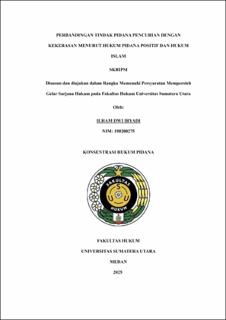| dc.description.abstract | Robbery with violence is an act of taking property accompanied by threats or acts of violence, differing from ordinary theft which is carried out secretly. This study aims to examine the legal provisions and sanctions for this criminal offense under both criminal law and Islamic law, as well as to analyze their comparison. The research method used is a normative juridical approach with descriptive-analytical characteristics. The findings show that, in Indonesian criminal law, this offense is regulated under Article 365 of the Criminal Code (KUHP), while in Islamic law it is found in the Qur’an, Surah Al-Maidah verse 33. Sanctions under Indonesian criminal law are based on the level of violence used, ranging from imprisonment to the death penalty in cases where the victim suffers serious injury or death. In contrast, Islamic law imposes harsher penalties such as amputation of hands and feet or the death penalty, depending on scholarly interpretation. The comparison between criminal law and Islamic law reveals both similarities and differences. The similarity lies in the fact that both consider the act as unlawful and aim to protect property through deterrence of violence or threats. The difference is that the Criminal Code is seen as less comprehensive compared to Islamic law, as it does not explicitly address theft committed openly or with the use of weapons or excessive force. The comparison of sanctions also shows that while both legal systems aim to maintain peace, security, and public order, criminal law imposes varied penalties depending on the severity of the crime, whereas Islamic law applies stricter punishments such as execution, amputation, and imprisonment. | en_US |


